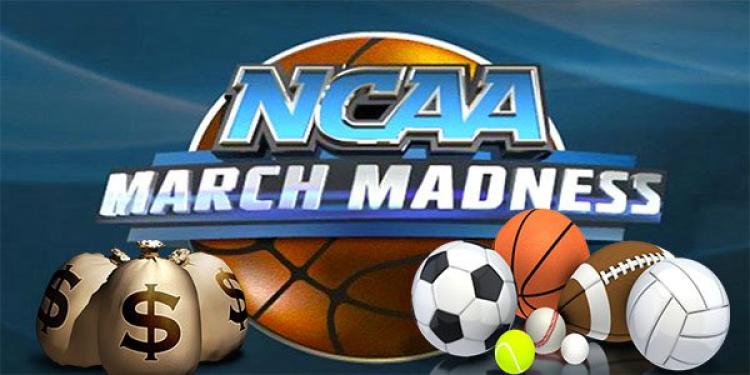March Madness May Leave The NCAA in the Shadow of Vegas
Posted: March 12, 2015
Updated: October 6, 2017

The much billed and traditional tournament may leave the NCAA in competition with Las Vegas.
This week seven conference tournaments will be contested in Las Vegas. With four men’s and three women’s tournaments taking place, Las Vegas will be the place of much concentration as it is every year. The proximity of these college athletic events to the mecca for gambling has caused some scrutiny. Of course it’s difficult to ignore the extreme amount of subsidiary revenue for Vegas connected to these sporting events. It may leave the impression that these events are simply an addition to the conduit for sports betting in the U.S.
Las Vegas is ground zero for March Madness
Along the walkways inside the MGM Grand, you’ll see a plethora of advertisements you’ll find Pacific-12 team banners amidst the famous gold lion statue in the lobby donned with a basketball jersey. Across the way at the Orleans Hotel and Casino just finished its patronage of the West Coast Conference tournament and are preparing for the arrival of the Western Athletic Conference tournament. The main campus at the University of Las Vegas will feature the Mountain West Conference tournament.

These tournaments are not only crucial for March Madness but for Vegas revenue as well. The winners of these tournaments receive automatic positions in the March Madness tournament brackets which will be determined on the March 15th. At this time, Vegas gets so much added revenue from visitors who also gamble legitimately. Despite the obvious symbiotic bond between Vegas and the NCAA, the relationship is always shaky due to sports betting much of which is in the confines of U.S. gambling laws.
Keeping Las Vegas at Bay Proves to be a Challenge
According to the FBI, up to $2.5 billion is wagered each year during the three week national tournament. These numbers exceed that of the Super Bowl. And to have situation right beside the mecca for gambling can create a volatile situation. Many have concerns over gamblers or even casino associates gaining inside information from players, coaches, staff anyone related to the tournament. Bribes that could influence the outcome of the games are also most possible.
• NCAA conferences tournaments are in Vegas
• Much controversy over possibility of gambling
• Efforts being made to distance NCAA from Vegas
The legalization of sports betting in the U.S is a hot issue currently. Las Vegas represent the fiery pit of this controversy. All four major sports in the U.S do not have a professional time in Las Vegas. Emily James, NCAA associate director of media relations said “the spread of legalized sports wagering is a threat to student-athletic well-being and the integrity of athletic competition.” The NCAA has rules that disallow any NCAA tournament games from taking place in any state that allows legal wagering on team outcomes.
Efforts have been Made in the Past
In the past, some tournaments have tried to move to alternate locations. The Mountain West, currently appearing in Vegas, were in Denver for three years during the mid-2000s. Unfortunately 5,000 more fans visited Vegas and they received double the tournament revenue. The Pacific-12 or Pac-12 tournament was held in LA for the past 10 years, but moved to Vegas in 2013. LA was unable to compete with bigger crowds, more visibility and more fan entertainment.

When the WCC agreed to bring its tournament to Las Vegas, it was with some stipulations. Tournament play was prohibited at the Orleans sports book and the stadium prevented the sale of beer and alcohol. Even though this is the only tournament with these restrictions in Vegas, it didn’t seem to stop the fans from coming. WCC fan and regular patron of the tournament Paul Meseberg said “if we wanted to bet on games, there are plenty of other places we could go to.”
A survey in 2012 by the NCAA included 23,000 student-athletes and concluded that 57% of men and 39% of women had gambled for money in the past 12 months. This was fewer than in a similar study for year previous to this one. The 2012 report revealed that only 2% of Division I basketball players (those directly in March Madness tournament) were approached by people to influence the outcome of games. Although it is always possible to gamble on tournament games, the overall situation appears as though NCAA constituents can be near the fire without being burnt.












